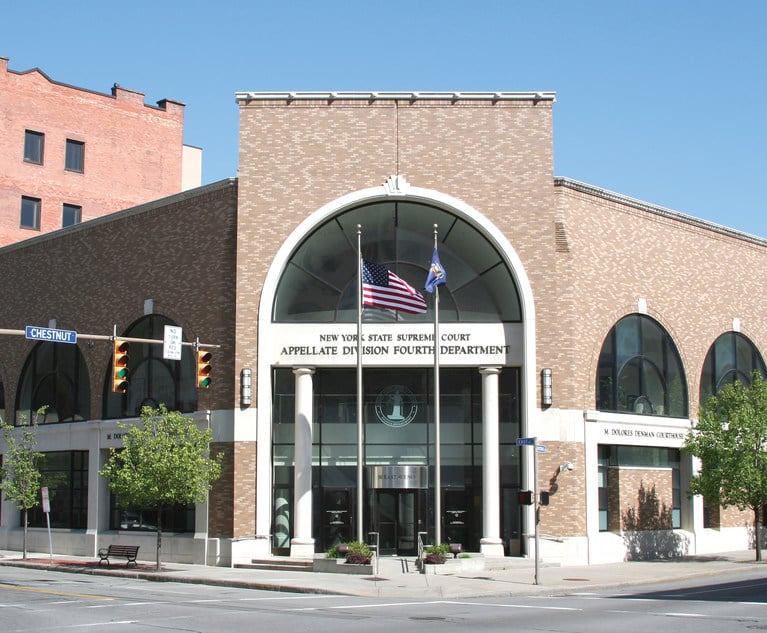Bumpy Litigation Ride for Patron Who Lost an Eye at the Fair
The Florida Fourth District Court of Appeal reversed a circuit court decision that had ruled in favor of plaintiff Windley Joseph, who lost use of his left eye at the fair in 2008. The court found the South Florida Fair had limited liability under Florida's sovereign immunity and state law for personal injury claims.
September 06, 2018 at 03:05 PM
4 minute read
 South Florida Fairgrounds. Photo courtesy of Wikimedia Commons
South Florida Fairgrounds. Photo courtesy of Wikimedia Commons
Ordinarily, the South Florida Fair is an ideal spot to take a load off.
But that was not the case for Windley Joseph, who lost an eye during an armed robbery there in 2008.
And Wednesday presented another blow for Joseph after a state appellate court capped his potential recovery in his lawsuit against the fair at $300,000. This limitation was established after the court ruled the fair qualified as an instrumentality of the state and has limited liability under Florida's sovereign immunity and state law for personal injury claims.
Here's the full Fourth DCA opinion:
According to a 2010 lawsuit filed in Palm Beach Circuit Court, Joseph and his two sons were waiting in line to use the bumper cars when a group of teenagers demanded his watch and beat him up after he refused to hand it over in February 2008.
Joseph said he lost his right eye in the assault and was left with permanent mental and physical injuries.
Joseph subsequently filed suit against the South Florida Fair for negligence and alleged that the fair had failed to provide adequate security for its patrons.
Read Windley Joseph's lawsuit against the South Florida Fair:
Although the circuit court initially agreed and ruled in Joseph's favor, an opinion issued in a Florida appellate court this week overturned that ruling.
The Fourth District Court of Appeal reversed the lower court's order and instead ruled in favor of the appellant, the South Florida Fair.
The fair had appealed the case maintaining the circuit court erred in denying its motion for summary judgment and rebuffing the argument that limited sovereign immunity shielded it from tort or personal injury claims.
The trial court initially found “the state did not have sufficient structural power over the South Florida Fair to render it an instrumentality of the state.”
Writing for a unanimous panel, Judge Jeffrey Kuntz disagreed and remanded the case for further proceedings. Judges Carole Taylor and Dorian Damoorgian concurred.
That's bad news for Joseph, who will now be limited to no more than $200,000 or $300,000 in damages from the fair as dictated by Section 768.28 of the Florida Statutes.
Joseph's counsel, Marwan Emmet Porter, managing partner at The Porter Law Firm in Stuart, did not respond to requests for comment by press time.
Carlton Fields Jorden Burt partner Matthew J. Conigliaro, who represented the fair along with fellow Carlton Fields partner Derek Harris, told the Daily Business Review that he was pleased with the court's ruling and what it means for his client moving forward.
“The law uses the phrase 'essential governmental purpose,' and that's how it characterizes the role of the fairs. And that's a historical role in Florida,” he said. “You can trace the local fairs back a century and the role they played and continue to play in educating the public on a variety of areas.”
While the door remains open for a rehearing, Conigliaro believes the appellate court “correctly applied the law to the facts in this case.”
Related stories:
Court Weighs Clerk's Immunity in Speed Trap Class Challenge
Florida Supreme Court Rules for UCF Athletic Association in Player's Death
This content has been archived. It is available through our partners, LexisNexis® and Bloomberg Law.
To view this content, please continue to their sites.
Not a Lexis Subscriber?
Subscribe Now
Not a Bloomberg Law Subscriber?
Subscribe Now
NOT FOR REPRINT
© 2025 ALM Global, LLC, All Rights Reserved. Request academic re-use from www.copyright.com. All other uses, submit a request to [email protected]. For more information visit Asset & Logo Licensing.
You Might Like
View All
Trump Media Accuses Purchaser Rep of Extortion, Harassment After Merger
4 minute read
Who Got the Work: Array of National Lawyers Appearing in Appeal Over Social Media Role in Buffalo Massacre

Tax Company Exactera Sues Ex-CEO, Alleging Harassing Litigation

New Precedent: Lawyers Took Too Long, So Litigants Struck a Doomed Deal
Trending Stories
- 1SDNY US Attorney Damian Williams Lands at Paul Weiss
- 2Litigators of the Week: A Knockout Blow to Latest FCC Net Neutrality Rules After ‘Loper Bright’
- 3Litigator of the Week Runners-Up and Shout-Outs
- 4Norton Rose Sues South Africa Government Over Ethnicity Score System
- 5KMPG Wants to Provide Legal Services in the US. Now All Eyes Are on Their Big Four Peers
Who Got The Work
Michael G. Bongiorno, Andrew Scott Dulberg and Elizabeth E. Driscoll from Wilmer Cutler Pickering Hale and Dorr have stepped in to represent Symbotic Inc., an A.I.-enabled technology platform that focuses on increasing supply chain efficiency, and other defendants in a pending shareholder derivative lawsuit. The case, filed Oct. 2 in Massachusetts District Court by the Brown Law Firm on behalf of Stephen Austen, accuses certain officers and directors of misleading investors in regard to Symbotic's potential for margin growth by failing to disclose that the company was not equipped to timely deploy its systems or manage expenses through project delays. The case, assigned to U.S. District Judge Nathaniel M. Gorton, is 1:24-cv-12522, Austen v. Cohen et al.
Who Got The Work
Edmund Polubinski and Marie Killmond of Davis Polk & Wardwell have entered appearances for data platform software development company MongoDB and other defendants in a pending shareholder derivative lawsuit. The action, filed Oct. 7 in New York Southern District Court by the Brown Law Firm, accuses the company's directors and/or officers of falsely expressing confidence in the company’s restructuring of its sales incentive plan and downplaying the severity of decreases in its upfront commitments. The case is 1:24-cv-07594, Roy v. Ittycheria et al.
Who Got The Work
Amy O. Bruchs and Kurt F. Ellison of Michael Best & Friedrich have entered appearances for Epic Systems Corp. in a pending employment discrimination lawsuit. The suit was filed Sept. 7 in Wisconsin Western District Court by Levine Eisberner LLC and Siri & Glimstad on behalf of a project manager who claims that he was wrongfully terminated after applying for a religious exemption to the defendant's COVID-19 vaccine mandate. The case, assigned to U.S. Magistrate Judge Anita Marie Boor, is 3:24-cv-00630, Secker, Nathan v. Epic Systems Corporation.
Who Got The Work
David X. Sullivan, Thomas J. Finn and Gregory A. Hall from McCarter & English have entered appearances for Sunrun Installation Services in a pending civil rights lawsuit. The complaint was filed Sept. 4 in Connecticut District Court by attorney Robert M. Berke on behalf of former employee George Edward Steins, who was arrested and charged with employing an unregistered home improvement salesperson. The complaint alleges that had Sunrun informed the Connecticut Department of Consumer Protection that the plaintiff's employment had ended in 2017 and that he no longer held Sunrun's home improvement contractor license, he would not have been hit with charges, which were dismissed in May 2024. The case, assigned to U.S. District Judge Jeffrey A. Meyer, is 3:24-cv-01423, Steins v. Sunrun, Inc. et al.
Who Got The Work
Greenberg Traurig shareholder Joshua L. Raskin has entered an appearance for boohoo.com UK Ltd. in a pending patent infringement lawsuit. The suit, filed Sept. 3 in Texas Eastern District Court by Rozier Hardt McDonough on behalf of Alto Dynamics, asserts five patents related to an online shopping platform. The case, assigned to U.S. District Judge Rodney Gilstrap, is 2:24-cv-00719, Alto Dynamics, LLC v. boohoo.com UK Limited.
Featured Firms
Law Offices of Gary Martin Hays & Associates, P.C.
(470) 294-1674
Law Offices of Mark E. Salomone
(857) 444-6468
Smith & Hassler
(713) 739-1250






